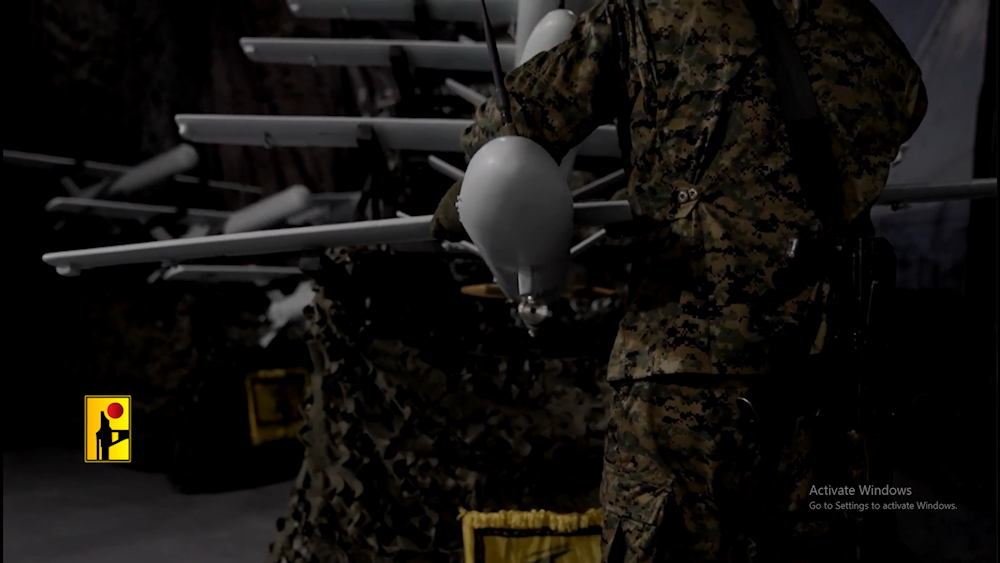Hezbollah, Hamas capabilities, tactics dominating war: Israeli media
Israeli media reports indicate that the Israeli occupation is concealing its losses as the Hezbollah and Hamas deal causes severe blows to the IOF.
-

Hezbollah drones shown in new video displaying the Resistance's capabilities released on October 14, 2024 (Military Media of the Islamic Resistance in Lebanon)
The Israeli occupation authorities have recently ramped up their efforts to impose strict media censorship, aiming to prevent any disclosure of material or human losses resulting from Hezbollah's operations in Lebanon. Despite these efforts, Israeli officials and analysts are voicing concerns over Hezbollah's formidable military capabilities and the profound impact on the Israeli occupation.
Israeli national security expert and retired Israeli military colonel Kobi Marom admitted on Channel 13 that Hezbollah’s rocket strength, combined with its leadership and control, poses a significant threat.
"The ground operation in Lebanon comes at a high cost for us," he warned, urging caution following previous miscalculations regarding Palestinian Resistance intentions. Marom added the need for increased budgets to reconstruct the Israeli occupation's damaged northern areas.
Additionally, Israeli media reported power outages at Israeli military positions along the border, attributed to the ongoing shelling from Lebanon.
Internal crisis over urban warfare
The Resistance's actions in Gaza and Lebanon are deepening internal divides within the Israeli military leadership.
Amir Bohbot, a military correspondent for the Israeli Walla news website highlighted a lack of coordination between the Israeli northern and southern commands. He described the ongoing crisis as a "war of minds" in both southern Lebanon and Gaza, fueled by Hezbollah and Hamas's shift to urban warfare tactics involving explosive devices.
According to Bohbot, there is a "significant gap" in the Israeli military structure, citing a recent incident in Gaza involving the 252nd Division, where veteran reserve soldiers refused to enter a Palestinian building due to insufficient backup from special units.
A reserve officer remarked that certain tasks are "detached from reality," stating that high-ranking leaders often ignore operational gaps, forcing missions despite apparent limitations.
Separately, Israeli Prime Minister Benjamin Netanyahu is reportedly preoccupied with the threat of drones, prompting him to delay his son Avner's wedding, originally scheduled for late November.
Israeli news site Srugim reported that Netanyahu fears potential drone attacks from Lebanon, Iraq, and Yemen. Netanyahu himself recently questioned, "What will we do if a drone reaches the Knesset?" while admitting that drones, despite advancements in the Israeli interception systems, remain a pressing concern due to their elusiveness.
Unrelenting pressure
Israeli forces have been caught off guard by Hezbollah's resilience, as the Resistance movement continues to launch rockets and drones, engaging Israeli forces at the border and inflicting notable losses. Calls to halt northern hostilities and negotiate an agreement have grown louder within the Israeli occupation.
In line with this sentiment, the Israeli Maariv newspaper acknowledged Hezbollah's capacity to sustain long-term pressure on the occupation through continued artillery and rocket fire. The newspaper confirmed that Hezbollah has retained its missile capabilities and has been intensifying attacks on Israeli cities such as Safad and Haifa.
Former Gaza Division commander, Maj. Gen. (Res.) Gadi Shamni also criticized Prime Minister Benjamin Netanyahu, describing him as "detached from his people and soldiers" and blaming him for what he called the government's "complete failure." Shamni argued that the Israeli occupation urgently needed to end the war and secure the release of captives.
Meanwhile, Hezbollah reiterated its readiness for prolonged confrontation and stated it would not accept a ceasefire on Israeli terms, asserting that it "negotiates from a position of strength," with the battlefield ultimately determining the outcome.
On his part, former commander of the Israeli Northern Corps, Noam Tibon, highlighted that more than 800 Israeli soldiers have been killed and around 12,000 injured, with thousands suffering from post-traumatic stress disorder (PTSD) since the war began a year ago.
"We have lost the manpower of a whole division, and we need three additional divisions; otherwise, we will find it difficult to defend Israel," Tibon underscored.
'Israel' has a long way to go to 'defeat Hezbollah': Jerusalem Post
On Monday, Israeli media reported that the number of Israeli soldiers killed in southern Lebanon is increasing daily rather than decreasing over time.
An analysis by Seth Frantzman published in the Israeli newspaper The Jerusalem Post pointed out that after a month into war with Lebanon, the Israeli operation has begun to "take a toll".
The strikes "Israel" conducted to supposedly weaken Hezbollah’s command and control have failed to meet their objectives, as the Lebanese group's leadership remains intact and capable of continuing its deadly operations, Frantzman indicated.
Despite that the assassination of Hezbollah commanders and Secretary-General Sayyed Hassan Nasrallah "should have weakened the group’s command and control," the Gaza war has revealed that such movements "are capable of replacing commanders even as they suffer blows," according to Frantzman.

 5 Min Read
5 Min Read









